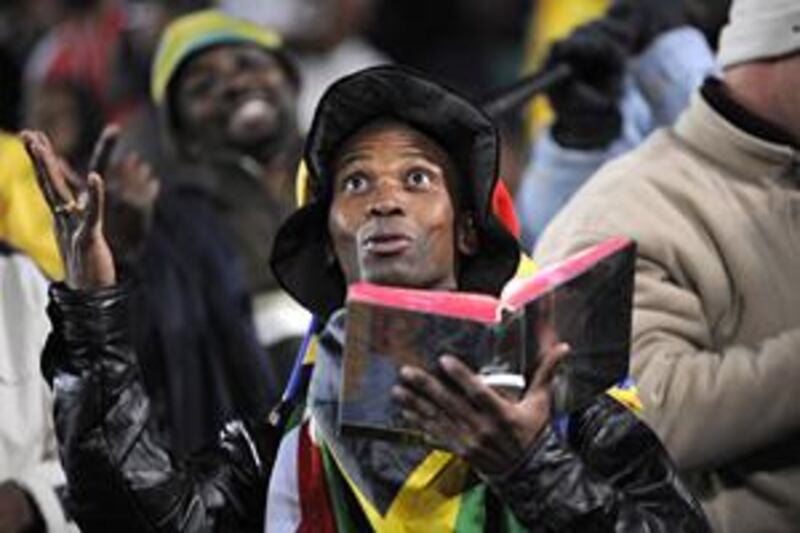Staging a big international sporting tournament is, in my view, a little like the process of getting married. The bid is the courtship, if you like. At this time you will be at your absolute best; charming, fragrant, with a puppy-like eagerness to please. If all goes to plan, engagement, a wedding and honeymoon will follow, each new step suffusing you with a glow of happiness and a buzz of anticipation - until suddenly the whirlwind of activity is over, and the awful realisation hits you that now you have to figure out how to make the thing work.
I am not quite as jaundiced on the subject - I have, after all, been married for 26 years - as the late film star John Barrymore who described love as "the delightful interval between meeting a beautiful girl and discovering she looks like a haddock." I feel, though, that for South Africa, who host the football World Cup in less than a year's time, the honeymoon is very much over. What South Africa is looking at this morning is a pungent haddock that will need an awful lot of tender loving care, if the 2010 tournament is not to end in tears. The two major sporting events taking place in the Republic in recent weeks have left no one in any doubt that it will take a lot of hard cash and even harder graft.
First, 30,000 British and Irish rugby fans turned up to watch the Lions play the Springboks in Durban, and many had to improvise wildly to get there for kick-off. Hotels in the city, which also plays host to World Cup matches, were booked solid weeks before the Lions match, and supporters were forced to take rooms two or three hours away. South African journalist Robyn Curnow said: "If there are not enough beds for a one-off rugby Test, how will Durban cope with the 500,000 visitors expected for the World Cup?"
Some Lions fans stayed in Cape Town, chartering planes to Durban at 5.30am and flying back the same evening. The situation was not a great deal better for last week's second Test in Pretoria, although I feel there will be no great demand for hotel rooms in Johannesburg for the final Test. Then there was football's Confederations Cup during which other issues arose. One travel agent said around a third of his clients had lost luggage at the airport. Crime was a problem too, with the Egyptian squad suffering thefts from their training camp.
On the credit side, crowds for the cup have been wildly enthusiastic, even if you wish they would not always show it by incessantly blowing the vuvuzela, the long plastic trumpet that sounds like a swarm of angry wasps, who have just found their car has been clamped. Still, it is a manifestation of the love for football. South Africa is up for the World Cup, of that there is no doubt. I just wish the entire financial burden did not always fall on the hosts. Given the amount of money sloshing around football worldwide, is it not beyond the wit of Fifa to give a boost to the hosts in these hard times and make the union of South Africa and World Cup one to be cherished?
So another Wimbledon tournament reaches its climax, and once more - Andy Murray and Laura Robson excepted - there has not been much joy for domestic followers. It certainly is not a lack of resources that is stifling the development of tennis in the UK, as Wimbledon itself generates millions in revenue for the Lawn Tennis Association, and the sport receives government funds too. So what is it? I reckon it is the tennis club culture in Britain, which is still terribly middle class and, dare I say it, middle-aged. When the clubs are full of old folks banging balls over the net, where is the next generation supposed to hone its skills? The answer increasingly, I am afraid, is Barcelona or Florida.
I may be in a minority but I would love to see Kevin Keegan back in English football. Sadly, it looks like reports of his return to manage one of his old clubs, Southampton, were premature, but at that level I think SuperKev - as those of us of a certain generation will always think of him - still has plenty to contribute. He did, after all, guide Fulham from the third to the top tier of English football. Some say his methods are old-fashioned, but football is a simple game, and promotion from the lower divisions relies on creating a team ethic and a fighting spirit. Anyone who thinks Keegan cannot do that has not been paying attention.
mkelner@thenational.ae





